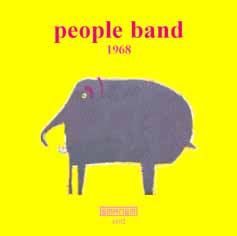
Were it not for a very insightful article by Julian Cowley published in June, 2002, issue of the Wire, this recording most likely would not have been reissued. A find in its own right, the disc reprises an obscure release of 1970 on the Transatlantic label by the even more obscure artists’s collective called “people band.” Of course, in those heady times, other similar bodies of muscians were fully engaged to the nascent cause of free music, with AMM and SME clearly signalling more radical paths of collective playing. While both of them managed to develop a following via a stream of recordings, people band, in contrast, did not. Unlike their contemporaries, this motley crew of musical explorers did not really have a ring master, or a real take-charge type of person with a definite ideological mindset. In it, there was no one comparable to a Derek Bailey, Eddie Prevost or John Stevens. Its drummer, Terry Day, may have been its most central figure, a kind of leader by default who actually did rally a number of musicians around him in its early stages. As for the music contained on this side, it is about as loose and informal as one can get. Quite unlike SME and AMM, which were definitely seeking to expunge all usual referential elements, people band excluded nothing. In effect, there are outright jazzy moments, like tenorman George Khan’s solo on the ninth track, some drum grooves and even three ‘conductions’ lead by Day himself, a decade or so before Lawrence D. "Butch" Morris would capitalize on the idea. As a bonus, the booklet is a worthy read, providing information about collective, who was in it, a few anecdotes on the session itself, some notes which cast doubt on whether this single document is really representative of it and, lastly, what became of its participants. (Interestingly enough, all of them are still around nowadays, albeit in varying states of health and, in the case of trumpeter Eddie Edem, with whereabouts unknown). The collective was comprised of Mel Davis, Lyn Dobson, Tony Edwards. Frank Flowers, Russel Hardy, Terry Holman, George Khan and maybe the best known of the crew, trumpeter Mike Figgis, whose reputation stems from his work as a filmmaker in Hollywood (Stormy Monday, Internal Affairs, Miss Julie).
For this reissue, fifteen extra minutes have been added to the original album, all of which was salavaged from discard bins at the recording studio by an employee working for the Rolling Stones' business office. (As odd as this may seem at first, this is explained by the fact that the original LP’s producer was none other than Rolling Stones drummer Charlie Watts.) After listening to this musical footnote of sorts, we are reminded of the fact that, yes, there is nothing new under the sun when it comes to free improvising collectives, almost all of which are still treading the same old beaten paths. Seen that way, one can surmise that for every apparently new or groundbreaking initiative, there just might have been someone else before that who may have done the same, or very close. In this sense, 1968 is an interesting piece of evidence, a document that is a period piece, for sure, but an artefact that also speaks to our time.
Comments and Feedback:



More Recent Reviews, Articles, and Interviews @ The Squid's Ear...


|

